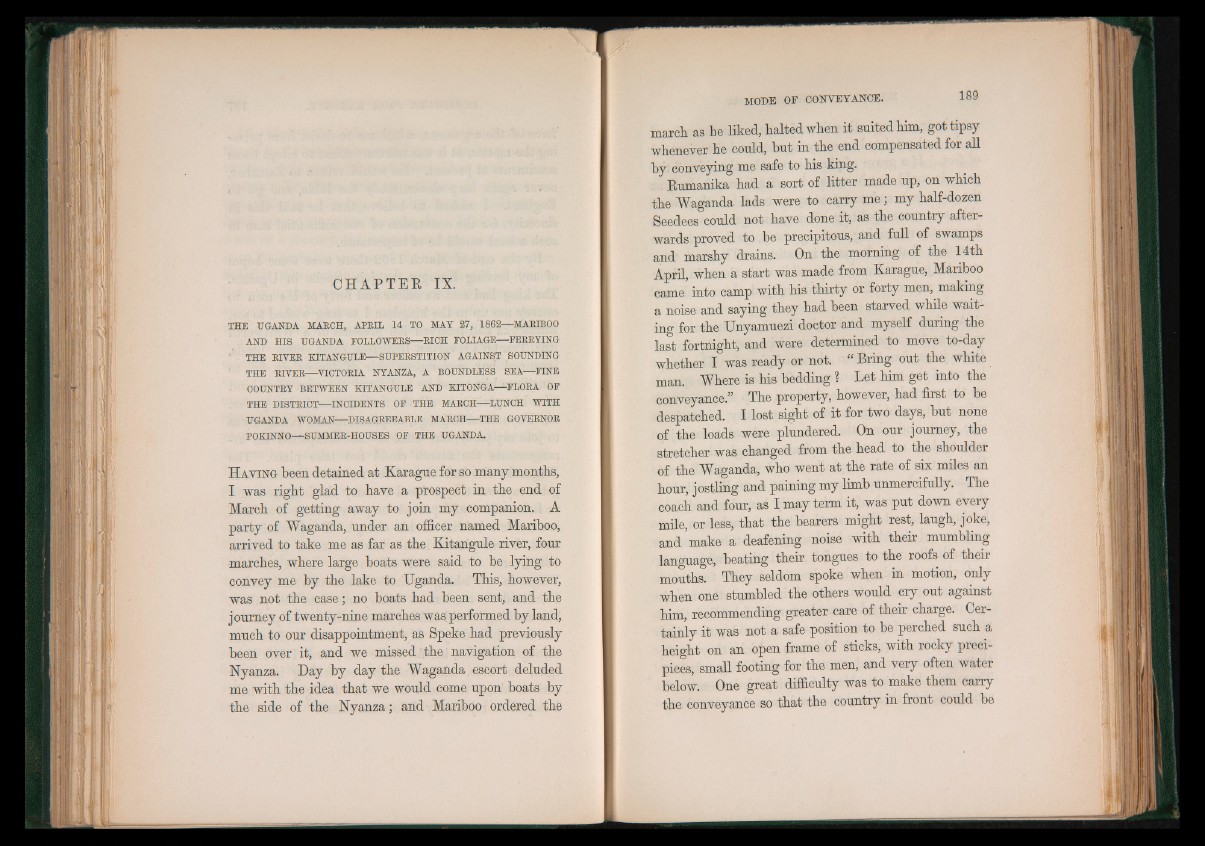
CH A P T E R IX.
THE UGANDA MARCH, APRIL 14 TO MAY 27, 1862— MARIBOO
AND HIS UGANDA FOLLOWERS— RICH FOLIAGE— FERRYING
THE RIVER KITANGULE— SUPERSTITION AGAINST SOUNDING
THE RIVER— VICTORIA NYANZA, A BOUNDLESS SEA—FINE
COUNTRY BETWEEN KITANGULE AND KITONGA—-FLORA OF
THE DISTRICT— INCIDENTS OF THE MARCH— LUNCH WITH
UGANDA WOMAN— DISAGREEABLE MARCH— THE GOVERNOR
POKINNO— SUMMER-HOUSES OF THE UGANDA.
H aying been detained at Karague for so many months,
I was right glad to have a prospect in the end of
March of getting away to join my companion. A
party of Waganda, under an officer named Mariboo,
arrived to take me as far as the Kitangule river, four
marches, where large boats were said to be lying to
convey me by the lake to Uganda. This, however,
was not the case; no boats had been sent, and the
journey of twenty-nine marches was performed by land,
much to our disappointment, as Speke had previously
been over it, and we missed the navigation of the
Nyanza. Day by day the Waganda escort deluded
me with the idea that we would come upon boats by
the side of the Nyanza; and Mariboo ordered the
march as he liked, halted when it suited him, got tipsy
whenever he could, but in the end compensated for all
by conveying me safe to his king.
Rumanika had a sort of litter made up, on which
the Waganda lads were to carry me; my half-dozen
Seedees could not have done it, as the country afterwards
proved to be precipitous, and full of swamps
and marshy drains. On the morning of the 14th
April, when a start was made from Karague, Mariboo
came into camp with his thirty or forty men, making
a noise and saying they had been starved while waiting
for the Unyamuezi doctor and myself during the
last fortnight, and were determined to move to-day
whether I was ready or not. “ Bring out the white
YYian. Where is his bedding ? Let him get into the
conveyance.” The property, however, had first to be
despatched. I lost sight of it for two days, but none
of the loads were plundered. On our journey, the
stretcher was changed from the head to the shoulder
of the Waganda, who went at the rate of six miles an
hour, jostling and paining my limb unmercifully. The
coach and four, as I may term it, was put down every
mile, or less, that the bearers might rest, laugh, joke,
and make a deafening noise with their mumbling
language, beating their tongues to the roofs of their
mouths. They seldom spoke when in motion, only
when one stumbled the others would cry out against
him, recommending greater care of their charge. Certainly
it was not a safe position, to be perched such a
height on an open frame of sticks, with rocky precipices,
small footing for the men, and very often water
below. One great difficulty was to make them carry
the conveyance so that the country in front could be